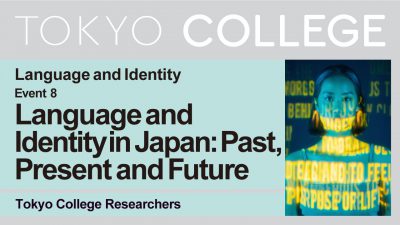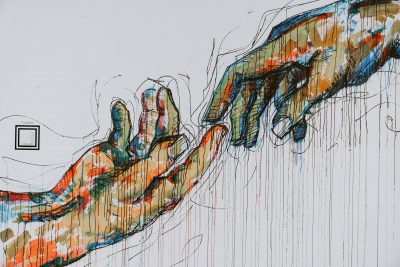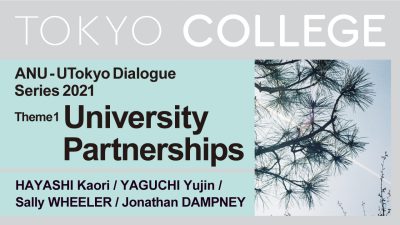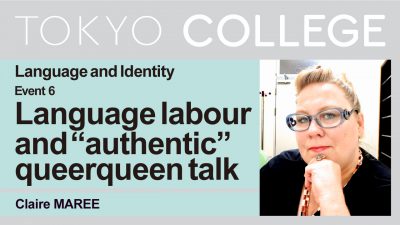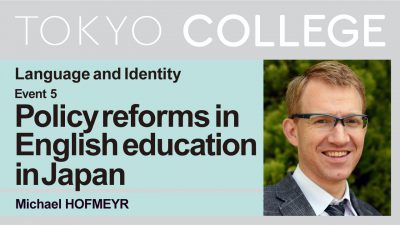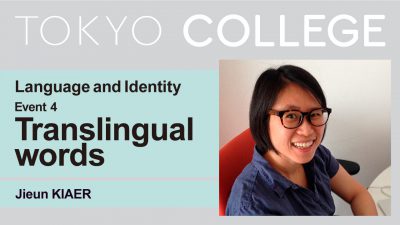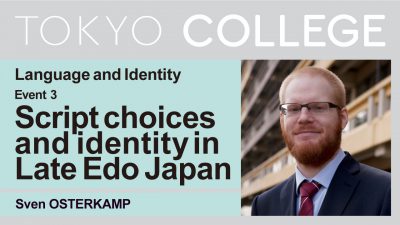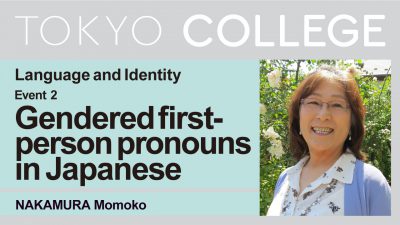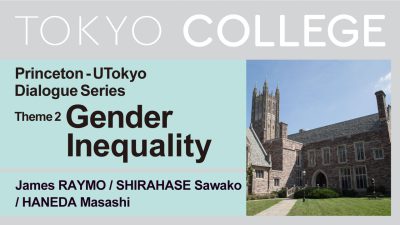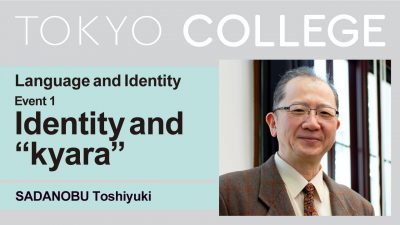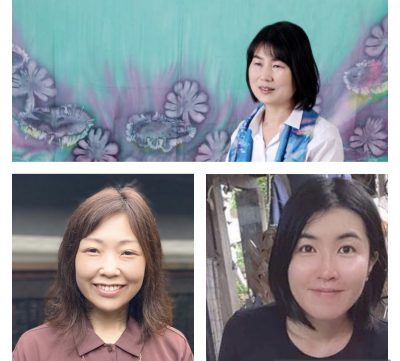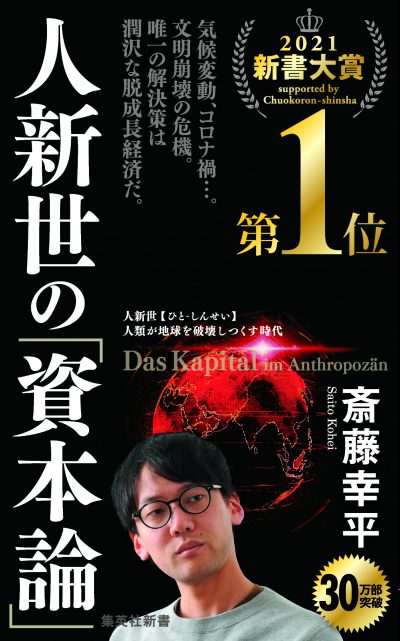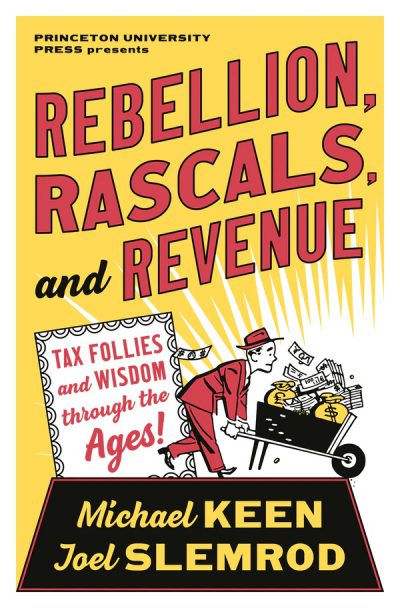Language and Identity Series Session 8: “Language and Identity in Japan: Past, Present and Future”
イベント予定パネルディスカッション/Panel discussionThursday, 25 November 2021, 17:00-18:30
In the concluding meeting of this series, members of Tokyo College discuss past and present issues, as well as the future outlook, of language and identity research in Japan.
Dialogues with UTokyo’s Partner Institutions: Perspectives on Society After COVID-19【ANU – UTokyo Dialogue】Session 3 Environmental changes and challenges in post-pandemic society
イベント予定共催/Joint EventAvailable from Wednesday, 24 November, 2021
Leading scholars from ANU and the University of Tokyo will discuss various aspects of post-pandemic society, including social issues highlighted by the pandemic and how we can better prepare for possible future crises.
Dialogues with UTokyo’s Partner Institutions: The Sixth Cambridge – UTokyo Joint Symposium Series Session One: COVID-19 Related Research and Challenge
イベント予定シンポジウム/Symposium共催/Joint EventWednesday, 24 November 2021, 5:00‐7:00 pm (JST)/ 8:00-10:00 am (GMT)
UTokyo-Cambridge Voices, started in 2020, is a series of conversations held between researchers of the University of Tokyo and the University of Cambridge regarding a specific aspect of their research. This dialogue series is hosted by the two institutions under the framework of the “Strategic Partnership” and explores research from a range of academic disciplines. This year, three university-wide online symposia will be open to the public. The theme of session one is "COVID-19 Related Research and Challenge".
Dialogues with UTokyo’s Partner Institutions: Perspectives on Society After COVID-19【ANU – UTokyo Dialogue】Session 2 Indigenous peoples and post-pandemic society
イベント予定共催/Joint EventAvailable from Tuesday, 23 November, 2021
Leading scholars from ANU and the University of Tokyo will discuss various aspects of post-pandemic society, including social issues highlighted by the pandemic and how we can better prepare for possible future crises.
Dialogues with UTokyo’s Partner Institutions: Perspectives on Society After COVID-19 【Princeton – UTokyo Dialogue】Session 4 International Affairs
イベント予定共催/Joint EventMonday, 22 November 2021, Available from 3:00pm
What impact has the coronavirus crisis had on society and on universities, and where should we go from here? Researchers from Princeton University and the University of Tokyo, two important partners, discuss these issues.
Dialogues with UTokyo’s Partner Institutions: Perspectives on Society After COVID-19【ANU – UTokyo Dialogue】Session 1 University partnerships in post-pandemic age
イベント予定共催/Joint EventAvailable from Monday, 22 November, 2021
Leading scholars from ANU and the University of Tokyo will discuss various aspects of post-pandemic society, including social issues highlighted by the pandemic and how we can better prepare for possible future crises.
Dialogues with UTokyo’s Partner Institutions: Perspectives on Society After COVID-19 【Princeton – UTokyo Dialogue】Session 3 Research
イベント予定共催/Joint EventMonday, 15 November 2021, Available from 5:00pm
What impact has the coronavirus crisis had on society and on universities, and where should we go from here? Researchers from Princeton University and the University of Tokyo, two important partners, discuss these issues.
Language and Identity Series Session 7: “Screams of Slaughter, Superstition, and Samurai: Exploring Language, Identity, and Premodern Japan in Japanese Extreme Metal”
イベント予定講演会/LectureSunday, 14 November 2020 (available from 17:00 JST)
In this talk, Dr. Wesley ROBERTSON examines Japanese extreme metal bands’ exploration of Japan’s history and myth through lyrics. Analyzing how three lyricists respond to local and global discussions of "metalness", he shows that creating Japanese metal lyrics opens avenues for designing translocal identities, and reimagining the referents of local language forms.
Language and Identity Series Session 6: “Queer Excess: Language labour and re(creating) ‘authentic’ queerqueen talk in the taidan (conversational dialogue) format”
イベント予定講演会/LectureSaturday, 13 November 2021 (available from 17:00 JST)
Media representations of queerqueen styles are configured as originating spontaneously from the authentically "queer male," and are then variously ventriloquised in production. In an analysis of published dialogues by twin brothers Osugi and Peeco, Dr. Claire MAREE illustrates the labour involved in (re)creating authenticity through which stereotypes of gender, sexuality, and desire are inscribed into contemporary media.
Language and Identity Series Session 5: “Recent Policy Reforms in English Language Education: Towards a New Generation of Bilingual and Multicultural Japanese?”
イベント予定講演会/LectureFriday, 12 November 2021 (available from 17:00 JST)
This presentation introduces a collaborative project to analyse the recently implemented MEXT policy reforms concerning English language education in Japanese schools. We will examine the stated aims of the reforms, their pedagogical soundness, implications for identity formation, as well as their likelihood of success.
Language and Identity Series Session 4: “Translingual Words: Is Sushi a Japanese Word or an English Word?”
イベント予定講演会/LectureThursday, 11 November 2021 (available from 17:00 JST)
Much like our own lives, the lives of words reflect complex and dynamic trajectories. In this talk, Dr. Jieun KIAER draws on her book Translingual Words (2019) to reevaluate the lives of English words, where lexical innovation has become an increasingly dynamic and interactive process with ordinary people at the helm.
Language and Identity Series Session 3: “Script choices as a means of indexing identities in Late Edo Japan”
イベント予定講演会/LectureWednesday, 10 November 2021 (available from 17:00 JST)
Featuring several distinct scripts, the Japanese writing system provides rich opportunities for the creation of meaning beyond the bare meaning of a text. In this talk, Prof. Sven OSTERKAMP evaluates how historically script choice once correlated with language choices, as well as with the intellectual context of both texts and authors.
Language and Identity Series Session 2: “Gendered First-person Pronouns in Japanese: Ideologies and Innovations”
イベント予定講演会/LectureTuesday, 9 November 2021 (available from 17:00 JST)
This talk demonstrates how speakers linguistically enact innovative identities despite restrictions that may be imposed by linguistic form. Prof. NAKAMURA Momoko's analysis of Japanese gendered first-person pronouns shows that while they maintain can reinforce patriarchical and heteronormative standards, some Japanese girls also utilize masculine pronouns to perform novel identities.
Dialogues with UTokyo’s Partner Institutions: Perspectives on Society After COVID-19 【Princeton – UTokyo Dialogue】Session 2 Gender Inequality
イベント予定共催/Joint EventMonday, 8 November 2021, Available from 3:00pm
What impact has the coronavirus crisis had on society and on universities, and where should we go from here? Researchers from Princeton University and the University of Tokyo, two important partners, discuss these issues.
Language and Identity Series Session 1: “Identity and ‘Kyara'”
イベント予定講演会/LectureMonday, 8 November 2021 (available from 17:00 JST)
This talk by Prof. SADANOBU Toshiyuki (Kyoto University) sheds light on a hidden connection between language and identity by focusing on “kyara,” an aspect of the self that changes according to the situation. He concludes that we should utilize “kyara” to go beyond the limitation of intention-based view of human social behaviors including language.
Eugenics Legacies in Japan: Revelations, Reparations, and Representation
イベント予定パネルディスカッション/Panel discussionMonday, 1 November 2021, Available from 5:00pm
This panel discussion will examine the history of eugenics in modern Japan as well as its local and global legacies. The panel will feature presentations on topics such as reproductive rights, media discourse around violent acts, and forced sterilization, followed by a discussion about the future implications of eugenics in Japan’s past and present.
Dialogues with UTokyo’s Partner Institutions: Perspectives on Society After COVID-19 【Princeton – UTokyo Dialogue】Session 1 University Management
イベント予定共催/Joint EventMonday, 25 October 2021, Available from 5:00pm
What impact has the coronavirus crisis had on society and on universities, and where should we go from here? Researchers from Princeton University and the University of Tokyo, two important partners, discuss these issues.
Dialogues with UTokyo’s Partner Institutions “Perspectives on Society after COVID-19”: A Conversation between Medical Researchers (Collège de France)
イベント予定対話/DialogueAvailable on October 20 2021 17:00
In this dialogue, two medical specialists from France and Japan will reflect on how the COVID-19 pandemic has revealed the strengths and weaknesses of their respective medical systems and discuss how, from the institutional and personnel perspective, to be better prepared for the possible future health crisis.
On Being Female and Japanese: Prospects and Challenges for Australian Indigenous Research in Japan
イベント予定共催/Joint EventMonday, 18 October, 2021 14:00-15:30 (JST)
What new insights have been gained in Australian Indigenous research through the addition of female and Japanese perspectives? In this event three Japanese women researchers talk about their experiences in the field and discuss the influence of their positionality on their research and analysis.
Mathematics: a typical or atypical model of academic excellence? An empirical study of the French case
イベント予定講演会/LectureWednesday, 13 October 2021, 10:00-11:30am (CEST) / 5:00-6:30pm(JST)
The excellence of French mathematics has long been recognized. Based on a vast corpus of career and publication data, we will explain the reasons from a sociological perspective.
In Conversation with the Author of “Das Kapital” in Anthropocene
イベント予定パネルディスカッション/Panel discussionTuesday, 12 October 2021, 4:00-6:00PM
What are the challenges facing the environment? One of the main research themes we pursue at Tokyo College is the “Earth and Society in 2050.” We invite everyone to join Tokyo College researchers to think through these questions and themes with SAITO Kohei, author of the best-selling book “Das Kapital" in Anthropocene (2020).
Ask the Authors! “Follies and Wisdom in the History of Taxation” by Michael KEEN and Joel SLEMROD
イベント予定講演会/LectureWednesday, 1 September 2021, 6:00-7:30 pm (JST) / 10:00-11:30 am (BST) / 5:00-06:30 (EDT)
The history of taxation, full of bizarre episodes and flashes of brilliance, is deeply instructive for today’s tax problems. Drawing on their new book Rebellion, Rascals, and Revenue, Michael Keen and Joel Slemrod show how stories from the past can both entertain and convey principles of good (and bad) taxation.
Symposium Series “The Future of the Humanities and Social Sciences”: Perspectives from the Sociology of Knowledge
イベント予定シンポジウム/SymposiumThursday, 29 July 2021, 17:00-19:00 pm
This panel invites international scholars who study knowledge systems in the past, present and future. Taking up themes from the first two panels, we will discuss perspectives on the future of the humanities and social sciences beyond the immediate pressures of institutional reform.
Symposium Series “The Future of the Humanities and Social Sciences”: The Humanities and Social Sciences Going Forward
イベント予定シンポジウム/SymposiumMonday, 19 July 2021, 10:00-12:00 am
In this panel, researchers from different backgrounds and specialties engage in a frank discussion on the shape of the humanities and social sciences to come. Their conversation touches on various topics, including the future and possibilities of these fields, as well as upcoming plans for education and research in these areas at the University of Tokyo.


